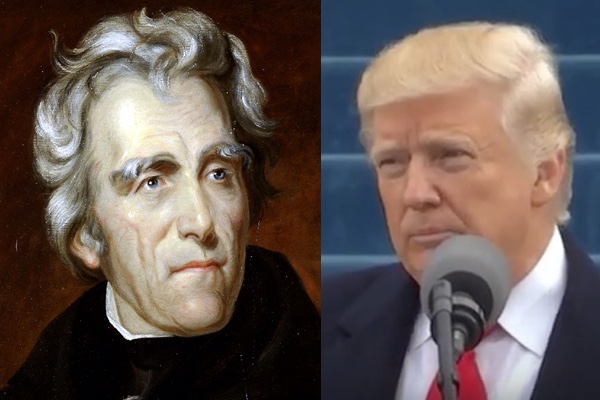President Trump’s Speechwriters Might Want to Re-examine Andrew Jackson’s Inaugural Address

A few days before Donald Trump was scheduled to take the oath of office as the forty-fifth president of the United States, he attended a celebratory dinner honoring his Vice President, Mike Pence. In what the New York Times called “a free-flowing speech,” Mr. Trump not only praised Pence’s political acumen, but also compared the GOP electoral victory to the movement that swept President Andrew Jackson into the White House. The former real estate developer has been compared to a number of past presidents including Richard Nixon and Ronald Reagan. However, the most frequent commentary has been about the similarities between the New York billionaire and the charismatic hero of the Battle of New Orleans.
While Mr. Trump has only briefly mentioned the comparison to “Old Hickory,” that hasn’t’ stopped surrogates like Rudy Giuliani or Newt Gingrich from touting the similarities. The comparisons were front and center following Mr. Trump’s inaugural address. "I don't think we've had a speech like that since Andrew Jackson came to the White House,” the Wall Street Journal quoted presidential advisor Steve Bannon, as saying. Mr. Bannon spoke from a position of authority. It was later learned that the former Breitbartexecutive and his colleague Stephen Miller were the authors of what many called one of the most provocative inaugurals ever delivered. But how accurate are Mr. Bannon’s comments in comparing the speech that President Trump gave last week and the address delivered by Jackson on March 4, 1829.
Both speeches had a number of features in common. Each man delivered comments that were short in length, concise in delivery and focused on themes of government reform. Trump’s remarks were extremely narrow, highly specific and reiterated many of the promises made during the 2016 campaign. While Jackson touched on topics like the controversial tariff that was causing economic hardship in cotton-rich states like South Carolina, the new president chose to deliver his speech in vague generalities. One would have thought that Jackson, a man of short temper and strong opinions, would have delivered remarks in the manner of President Trump. But the seventh president chose to keep his remarks broad because he understood the fickle nature of the American people. According to Jon Meacham in his book American Lion: “Jackson knew that politics, like emotions is not static.”
While the former land speculator may have been known for speaking his mind, Jackson was also experienced enough in public life to know that making promises that his opponents could later use against him was not a winning strategy. The former military commander knew that circumstances can change rapidly causing a chief executive to take action that his supporters may find difficult to accept. In making a series of enormously bold and highly specific promises, President Trump may soon wish that his advisors had studied his predecessor’s address with greater care, especially if his administration is unable to meet the challenges he has placed before the public.
The two men also issued powerful indictments of the political class. President Trump accused the members of the Washington establishment of enriching themselves at the expense of the nation’s citizens, while Jackson used similar language to cast blame on political elites who, he argued, had damaged the moral fabric of the nation. Both implied that their predecessors had become lazy and complacent, causing the public to become distrustful of the way the business of government was conducted. But, while Jackson may have been critical of those who composed the founding generation, he also expressed appreciation and admiration of the individuals who were responsible for crafting and refining the systems of checks and balances on which the nation was based. Jackson also reached out to the legislative and judiciary branches because he understood that being president was an “arduous” position, one that required all branches of government to work together if his administration was to succeed. The vagueness that Jackson displayed in his address may have been due to his hope that in offering an optimistic message following a contentious election he would receive the support of all the people, not simply those who had voted for him.
If that was Jackson’s idea it was a wise one. Many presidents have used the inaugural to give the country a sense of renewal, in order to then prepare it for the difficult days that could lie ahead. One would have thought that after the divisiveness of the 2016 campaign, President Trump would have followed a similar strategy to his elegant predecessor. While he talked about the benefits of a united America, unlike Jackson, Mr. Trump said nothing to communicate his desire to work in cooperation with the other branches of government. The new president also made no effort to offer an olive branch to the many segments of the country he had offended during his race for the White House.
There is no question that Mr. Trump thinks of himself as an agent of change, just as many supporters of Jackson did. However, in preparing the address, Bannon and Co. should not only have studied Jackson’s words with greater care, but also the man himself. As Meacham makes clear, Jackson understood the significant legacy he had inherited. Standing on the steps of the capital more than a hundred and eighty years ago, the man from Tennessee realized that like George Washington, people would not only be judging him on the sincerity of his words, but also on the content of his character. That is one lesson President Trump can learn from “Old Hickory” as he prepares to take his place as leader of the free world.